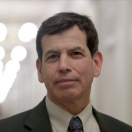
President Obama yesterday released the names of ten individuals whom he intends to appoint to the recently created Presidential Commission for the Study of Bioethical Issues. The ten will join the previously named chair and vice chair—University of Pennsylvania President Amy Gutmann and Emory University President James Wagner—in exploring bioethical issues anticipated to emerge from advances in biomedicine and related areas of science and technology. In a statement released with the names of the new Commissioners, the President said; “I am grateful that these impressive individuals have decided to dedicate their talent and experience to this important Commission. I look forward to their recommendations in the coming months and years.”
The new Commission differs in several ways from bioethics commissions created by previous Administrations. First, according to the terms of Executive Order (pdf) that created the new Commission, it is limited to a maximum of 13 people (with a total of 12 now named, President Obama has the option of appointing one more at a later date). That’s a smaller number than previous commissions, in part to keep the group nimble and facilitate discussion and consensus building.
Second, the Commission is tasked specifically with the goal of making practical, policy-oriented, ethics-based recommendations to the President, rather than devoting much of its time engaged in arcane philosophical discussions. Related to that goal, the Commission includes three members with science and bioethics expertise who work for Federal agencies—a significant shift from usual practice and one that is expected to help the group as it strives to provide advice that can be implemented in practical ways within the complex framework of Federal policymaking processes and procedures.
Third, the selected Commissioners are highly diverse in terms of professional backgrounds, geography, and experience. In a break from past practice, most are not professional bioethicists, but rather have worked and demonstrated extraordinary proficiency in an array of fields burdened with difficult challenges at the intersection of science, technology, and ethics. And although the Commission bears the word “bioethics” in its name, some members—including the vice chair—were selected in part because of their familiarity with ethics challenges raised technology as much as by biology. That reflects a growing society-wide recognition that many of today’s most difficult decisions at the boundaries of science and society are not just about biology and medicine but involve hardware, software and related technologies such as robotics.
The newly named individuals are listed below, and short biographies can be found at: http://obamawhitehouse.archives.gov/the-press-office/president-obama-announces-more-key-administration-posts-4-7-10
- Lonnie Ali, wife of Muhammad Ali and has been an outspoken advocate working to raise awareness of Parkinson’s disease
- Anita L. Allen, Professor of Law and Professor of Philosophy at the University of Pennsylvania Law School
- Barbara Atkinson, Executive Vice Chancellor of the University of Kansas Medical Center and Executive Dean of the University of Kansas School of Medicine
- Nita A. Farahany, Associate Professor of Law and Philosophy at Vanderbilt University
- Alexander G. Garza, Assistant Secretary for Health Affairs and Chief Medical Officer for the Department of Homeland Security
- Christine Grady, Acting Chief of the Department of Bioethics at the National Institutes of Health Clinical Center
- Stephen L. Hauser, Professor and Chair of the Department of Neurology at the University of California – San Francisco
- Raju Kucherlapati, Professor in the Harvard Medical School Department of Genetics and in the Department of Medicine at Brigham and Women's Hospital
- Nelson Michael, Director of the Division of Retrovirology at the Walter Reed Army Institute of Research and the Director, U.S. Military HIV Research program
- Daniel Sulmasy, a Franciscan Friar and associate director of the MacLean Center for Clinical Medical Ethics at the University of Chicago


